U.S. Air Force Vietnam War Hammond, IN Flight date: 09/25/24
By Al Rodriguez, Honor Flight Chicago Veteran Interview Volunteer
“Good morning, Vietnam!”
Donald Taylor says he’s not that guy. That radio sign-on slogan was used by Pat Sajak and the other Armed Forces Vietnam Network radio DJs that worked the Dawn Buster show in Saigon. Don was the DJ in Qui Nhon and his sign-on slogan on the Music Machine show was, “How sweet it is! Hello out there in Qui Nhon Land!” Qui Nhon was one of the six areas in Vietnam that broadcasted 24 hours a day, 7 days a week top 40 music and television shows to provide a little taste of home for the people serving there.
Don was born in Harriman, Tennessee. He was the older of two children. His dad was a WWII Army veteran. When Don was three years old, his dad found work in the steel mills of Northwest Indiana and moved the family to Hammond, Indiana. When he was a teenager he saw the Rolling Stones on the Ed Sullivan Show and wanted to be in a rock band. He said it was a good way of meeting girls. Don took music lessons from a couple of local music stores and joined a cover band called the Washington Tugboats playing bass. He graduated from Hammond Technical Vocational High School in 1967.
After graduation, Don went to work for Jones and Laughlin Steel Company. He loved music and listened to the DJ’s on the Chicago radio stations thinking he’d like to be a broadcaster. He enrolled in the Career Academy of Radio and TV Broadcasting in Chicago and received his FCC 3rd Class broadcasting license. At that time if you weren’t enrolled in a four-year university, you would be drafted into the Army. Don went to the different military recruiters and the Air Force was the only one that said, “We have a career for you.” He signed up and October of 1968 went to basic training at Lackland Air Force Base in San Antonio Texas. He said at first it was tough but he got used to it. Since he had his broadcasting license, he didn’t have to go to a technical school and was assigned to be a Radio/Television Production Specialist.
Don was sent to Lowry Air Force Base Colorado as his first duty station. At Lowry he was assigned to making military training films. He learned how to work with the cameras and to time the Teleprompters to the correct speed for the broadcasters to read. He married his high school sweetheart, Pattie, on July 5, 1969. Two days into his honeymoon he was told to report back to Lowry: he had orders for Vietnam. Don’s mom was ill so he tried to get a humanitarian assignment to Chanute Air Force Base Illinois to be close to home. This request delayed his deployment to Vietnam and his wife joined him at Lowry. His request was denied, his wife went home, and he reported to Travis Air Force Base to leave for Vietnam. He flew on Saturn Airlines, a privately contracted plane that transported military personnel. In early October after several stops he arrived in Saigon during the monsoon season and couldn’t believe how rainy, hot, and humid it was.
Don was assigned to the Military Assistance Command Vietnam, specifically to the Armed Forces Vietnam Network. Don has a MAC-V tattoo that is fading now. The AFVN was headquartered in Saigon. They housed him for three days at a hotel until he got his assignment. He spent those three days checking out the Saigon studio and meeting the staff. He said he probably met Pat Sajak, who was assigned there but at that time he was just another DJ. He received his orders to Qui Nhon which was 300 miles northeast of Saigon and was flown there by a C130 Air Force transport plane.
At Qui Nhon, the AFVN center of operations was located at the top of the mountain along with the television station. At the bottom of the mountain was the radio station where Don was assigned. They used a jeep to go back and forth. Don said the radio station was a little compound that had the studio and a four-bedroom house surrounded by bunkers with Marines to guard them. The studio was enclosed with no windows but air conditioned. It was manned by joint service people: Air Force, Army, Marines, and Navy. The house wasn’t air conditioned but it made up for that by having 4 bedrooms, a music and day room.
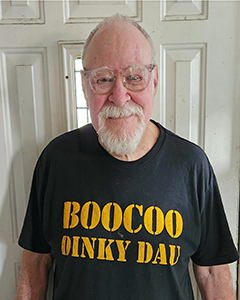
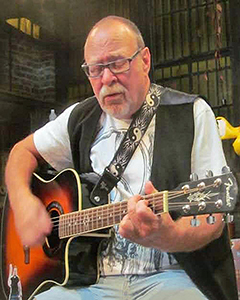
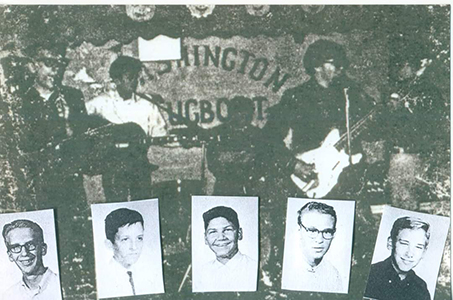
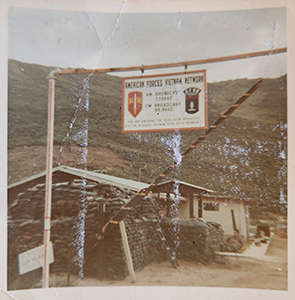
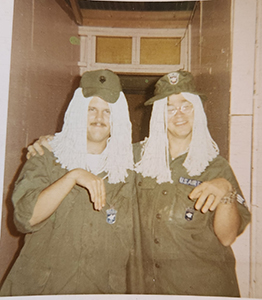
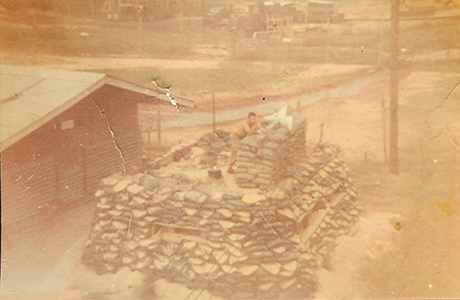
He worked eight hours every day. Since he was the new guy, his first assignment was the midnight shift. He spent most of the time programming his music selection, making his own commercials, re-reading military announcements and on-air sound checks. His one-hour live show, All That Jazz was at the end of his shift. He played R&B and Motown records. He was familiar with most of the popular music listening to WLS and other radio stations in Chicago. In the 1960’s WLS played every genre of music. Many of the soldiers thought he was African-American because of his knowledge of R&B. As the other DJ’s went home he was promoted to their spots. From overnight he went to broadcasting the Noon to One show and then to the desired 8:00 to 9:00PM The Music Machine show. He played a wide variety of music just like they did on the Chicago stations he listened to back home. One of his biggest concerns was LP record skips while on the air.
When he wasn’t working he played basketball, went to nearby Red Beach and into Qui Nhon base for any staples needed. The 67th Evacuation Hospital with the 498th Medical Company Air Ambulance was located at Qui Nhon. The 498th used Huey helicopters to transport injured soldiers and they flew night and day. Don said the Huey helicopters make a particular sound while flying. When he hears one, it triggers memories of his time in Vietnam and even today he tries to locate it in the sky.
In April of 1970 Don was sent to Hawaii for R&R and his wife met him there. At a music shop he saw the Woodstock album that he had not heard and brought it back to Qui Nhon. All the music the DJ’s received in Vietnam were screened by the AFVN and if a song was deemed inappropriate it would not be played on air. Don listened to it but with all the cursing and anti-war rhetoric he knew better than to play it on his show. He had been previously reprimanded for playing the anti-war song War by Edwin Starr.
Don loved working with the other DJ’s. He formed a lifelong friendship with his mentor, R. Michael. R. Michael showed him the ropes and gave him the nickname, Quart Low because he fell asleep on the beach with a towel over the upper part of his face and his face burned from his nose down. R. Michael said he looked like he was low a quart of oil. The DJ’s were always playing pranks on each other, like setting the paper the DJ was reading on fire while they were on the air.
Even though he enjoyed his job he was still in a war zone. Periodically their compound would come under fire by mortar and small arms. Don had to fire his weapon towards the muzzle flashes in the distance from his assigned spot in the bunker. Of course they took these attacks seriously but especially because in 1968 during the Tet Offensive the broadcasting station at Hue was attacked and overrun. The personnel that weren’t killed were taken to a North Vietnam POW camp.
In October of 1970 Don finished his tour. His orders sent him back to Lowry AFB but first he was able to go home on leave. He and his wife drove to Colorado. At Lowry they assigned him again to making Training Films. He said there were only two studios with many people needing to use them, pretty boring work with very little to do. His wife had a son, Matthew, in January of 1972. Don was honorably discharged from the Air Force October of 1972 and the family moved back to Hammond.
Don went back to his job at the Jones and Laughlin Steel Company. He had another son, Jacob, in March of 1974. He coached his son Jacob’s little league team for five years and they won four championships. Don enrolled at Purdue Northwest University and took a Theater Appreciation Class. The class had to put on and be graded on a one-act play. He said he was bitten by the acting bug. Don joined his first local community theater group in Northwest Indiana Civic Theater of the Calumet Region. He even took classes at Second City to learn improvisation to help him with acting. Over the years he has been part of many community theater groups in Northwest Indiana acting and sometimes playing a musical instrument. He’s been nominated five times as an actor and seven times for directing plays to the Northwest Indiana Excellence in Theater Foundation. In 2015 he won the NIETF’s Best Featured Actor in a Play award.
In 1987 a friend talked Don into joining the Army National Guard that was located in Hammond. He was a passenger in a vehicle returning with supplies from Camp Atterbury. The vehicle was struck by another and it rolled down a hill. Don had to be cut out of it and suffered head and hand injuries. He was transported to Great Lakes Naval Hospital for treatment. His wrist never healed properly. The VA, this year, has finally recognized it as a service-related injury. Don has had other health issues possibly from his time in Vietnam.
Don retired in 2013 to help with the care of his son Matthew who passed shortly after. He has slowed down but is still acting and directing with Beatniks on Conkey, a local community theater in Hammond. He says that acting and the theater is still his passion. Don has written a children’s play, The Big Bad Ugly and is writing another Meanwhile Back in the Woods. Musically, he plays guitar weekly with his friends.
About his time in Vietnam, he said it was great duty and can still vividly remember his time there.
Don’s never been to D.C. and is looking forward to seeing the memorials but especially the Vietnam Wall Memorial. He may not know anybody on the flight but maybe somebody remembers his show in Qui Nhon.
Don you’ll never know how many people living in a war zone you helped with your show by easing their anxiety and homesickness. Thank you and enjoy your day in D.C!


